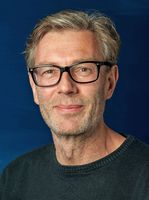
In the North and Baltic Seas, every square metre is being fought over: Traditional users such as fisheries are increasingly competing with wind farm operators, ship owners, raw material producers, the military, environmental protection and nature conservation for the scarce marine space. With the argument of the necessary energy transition, offshore energy producers are currently asserting themselves against many other interests. What could a peaceful co-existence of all interest groups look like?
"We currently have just under eight gigawatts of offshore wind power capacity in the North and Baltic Seas. By 2045, this figure is set to rise to 70 gigawatts. In comparison, we have relatively little ocean area available. That's when things start to get tight."
Karina Würtz, Foundation Offshore Wind Energy
In order to implement the 70 gigawatts of electricity from offshore wind energy agreed in the coalition agreement, the space available is not sufficient to meet the spatial requirements of all users, including marine nature conservation. Some of the marine areas in the German Exclusive Economic Zone (EEZ) would be overplanned several times. Co-use of areas, for example of wind farm areas by certain forms of fishing or aquaculture, is technically possible and also permitted in other countries such as Denmark or the United Kingdom. In Germany, this has so far been prohibited in principle - also with the argument that the exclusion of use from wind energy areas compensates for the encroachment on nature and thus serves nature conservation.
Our guests Karina Würtz, Foundation Offshore Wind Energy, and Dr Gerd Kraus, Thünen Institute for Sea Fisheries, discuss questions such as: Can we dovetail several uses on one area through a more ecologically and economically sensible division of the marine space and clever combinations in such a way that, on the one hand, a peaceful co-existence of all actors and their justified interests becomes possible and, on the other hand, the overarching socio-political goals of the energy transition and nature conservation are also brought into harmony? Would it be possible, for example, to allow the co-use of wind farm areas where the ecological value of the areas is rather low and to combine it with aquaculture (e.g. algae farming in the Baltic Sea, mussel farming in the North Sea) or with silent fishing for certain high-quality edible fish or crab species? Can wind farms promote nature conservation in ecologically particularly valuable areas such as biodiversity hotspots?
Sources and further readings
- The Federal Maritime and Hydrographic Agency: Maritime Spatial Plan of the North Sea and Baltic Sea
- Thünen à la carte „Offshore-Windparks: Chance für Fischerei und Naturschutz“ (in German)
- Stelzenmüller, V., Cormier, R., Gee, K., Shucksmith, R., Gubbins, M., Yates, K.L., Morf, A., Nic Aonghusa, C., Mikkelsen, E., Tweddle, J.F., Peccu, E., Kannen, A., Clarke, S.A. (2021a) Evaluation of marine spatial planning requires fit for purpose monitoring strategies. Journal of Environmental Management 278.
- Stelzenmüller, V., Gimpel, A., Haslob, H., Letschert, J., Berkenhagen, J., Brüning, S. (2021b) Sustainable co-location solutions for offshore wind farms and fisheries need to account for socio-ecological trade-offs. Science of the Total Environment 776, 145918.
- Stelzenmüller, V., Letschert, J., Gimpel, A., Kraan, C., Probst, W.N., Degraer, S., Döring, R. (2022) From plate to plug: The impact of offshore renewables on European fisheries and the role of marine spatial planning. Renewable and Sustainable Energy Rev.

Karina Würtz is the managing director of the Foundation Offshore Wind Energy. The economist and political scientist has been active in the field of renewable energies for many years. Most recently, she managed an offshore wind farm off Helgoland. The Foundation Offshore Wind Energy was established in 2005 on the initiative of the Federal Ministry for the Environment, Nature Conservation and Nuclear Safety to integrate offshore wind energy into Germany's energy mix. All coastal states and all economic sectors involved in offshore wind energy were also involved.

Dr. Gerd Kraus is a fisheries biologist and heads the Thünen Institute of Sea Fisheries in Bremerhaven. The research there is the basis for advising policy-makers on all issues concerning the protection and sustainable use of marine resources in the North Sea and the North Atlantic. However, it also serves as a basis for the development of integrated fisheries management that combines protection and utilisation goals and allows for sustainable solutions for the coexistence of different forms of utilisation.

![[Translate to English:] Logo des Bundesministerium für Ernährung und Landwirtschaft](/media/allgemein/logos/BMEL_Logo.svg)
Comments (0)
No comments found!